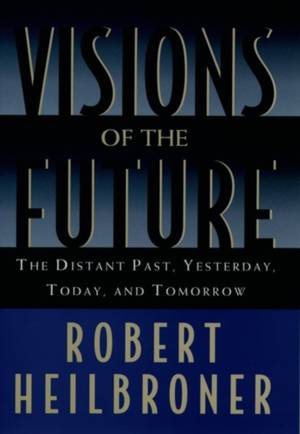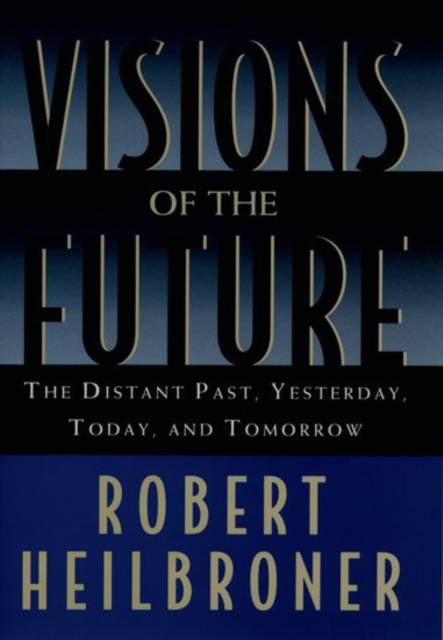
Bedankt voor het vertrouwen het afgelopen jaar! Om jou te bedanken bieden we GRATIS verzending aan op alles gedurende de hele maand januari.
- Afhalen na 1 uur in een winkel met voorraad
- Gratis thuislevering in België
- Ruim aanbod met 7 miljoen producten
Bedankt voor het vertrouwen het afgelopen jaar! Om jou te bedanken bieden we GRATIS verzending aan op alles gedurende de hele maand januari.
- Afhalen na 1 uur in een winkel met voorraad
- Gratis thuislevering in België
- Ruim aanbod met 7 miljoen producten
Zoeken
Visions of the Future
The Distant Past, Yesterday, Today, Tomorrow
Robert L Heilbroner
Paperback | Engels
€ 15,95
+ 31 punten
Omschrijving
"This is an exceedingly long short book, stretching at least fifty thousand years into the past and who knows how many into the future." So begins Visions of the Future, the prophetic new book by eminent economist Robert Heilbroner. Heilbroner's basic premise is stunning in its elegant simplicity. He contends that throughout all of human history, despite the huge gulf in social organization, technological development, and cultural achievement that divides us from the earliest known traces of homo sapiens, there have really only been three distinct ways of looking at the future.
During a period Heilbroner refers to simply as the Distant Past, stretching from prehistory to the appearance of modern nation-states in seventeenth century Europe, there was no notion of a future measurably and materially different from the present or the past. From the Stone Age to the Bronze, Mesopotamia and Egypt to Greece and Rome, and throughout the Middle Ages, a continuum of cultures and civilizations shared one defining expectation--the absence of any expectation of material progress for the great masses of people.
Heilbroner maintains that it was not until the first stirrings of the period he refers to as Yesterday, spanning from roughly 1700 to 1950, that the future entered into human consciousness as a great beckoning force. Capitalism, continually reinvigorated by the seemingly endless forward march of science and an evolving sense of democracy, appeared to promise all levels of society some expectation of a future at least somewhat better than the past. It was this unwavering faith in the superiority of the future that separated Yesterday from the age we have now entered, that of Today. While we are still driven towards tomorrow by the same forces that determined the recent past, the lessons of Hiroshima and Chernobyl, the chaos in the former Soviet Union, the stagnation of the West, and the anarchic rage unleashed in our inner cities and in hot spots around the globe have brought on a palpable anxiety that is quite apart from both the resignation of the Distant Past or the bright optimism of Yesterday.
In a brilliant conclusion drawing together the threat of nuclear blackmail, global warming and the growing commodification of life represented by video games, voice mail, and VCRs, Visions of the Future issues a call to face the challenges of the twenty-first century with a new resolve strengthened by the inspiration of our collective past.
During a period Heilbroner refers to simply as the Distant Past, stretching from prehistory to the appearance of modern nation-states in seventeenth century Europe, there was no notion of a future measurably and materially different from the present or the past. From the Stone Age to the Bronze, Mesopotamia and Egypt to Greece and Rome, and throughout the Middle Ages, a continuum of cultures and civilizations shared one defining expectation--the absence of any expectation of material progress for the great masses of people.
Heilbroner maintains that it was not until the first stirrings of the period he refers to as Yesterday, spanning from roughly 1700 to 1950, that the future entered into human consciousness as a great beckoning force. Capitalism, continually reinvigorated by the seemingly endless forward march of science and an evolving sense of democracy, appeared to promise all levels of society some expectation of a future at least somewhat better than the past. It was this unwavering faith in the superiority of the future that separated Yesterday from the age we have now entered, that of Today. While we are still driven towards tomorrow by the same forces that determined the recent past, the lessons of Hiroshima and Chernobyl, the chaos in the former Soviet Union, the stagnation of the West, and the anarchic rage unleashed in our inner cities and in hot spots around the globe have brought on a palpable anxiety that is quite apart from both the resignation of the Distant Past or the bright optimism of Yesterday.
In a brilliant conclusion drawing together the threat of nuclear blackmail, global warming and the growing commodification of life represented by video games, voice mail, and VCRs, Visions of the Future issues a call to face the challenges of the twenty-first century with a new resolve strengthened by the inspiration of our collective past.
Specificaties
Betrokkenen
- Auteur(s):
- Uitgeverij:
Inhoud
- Aantal bladzijden:
- 144
- Taal:
- Engels
Eigenschappen
- Productcode (EAN):
- 9780195102864
- Verschijningsdatum:
- 25/01/1996
- Uitvoering:
- Paperback
- Formaat:
- Trade paperback (VS)
- Afmetingen:
- 137 mm x 219 mm
- Gewicht:
- 190 g

Alleen bij Standaard Boekhandel
+ 31 punten op je klantenkaart van Standaard Boekhandel
Beoordelingen
We publiceren alleen reviews die voldoen aan de voorwaarden voor reviews. Bekijk onze voorwaarden voor reviews.












